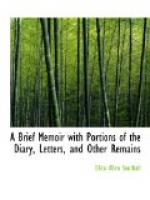I hope these feelings are not infectious, or I certainly would not inflict on thee the description. But do not take this as a general picture of me. It is a morbid occasional state of things; consequent, by reaction, on the exclusiveness of aim with which those things were followed. I learned sooner than I suppose many do, the earnestness, coldness, reality of life; and there has come an impression of its being too late to prepare for life, and quite time to live. However imperfectly, I have learned that to live ought to be to prepare to die; but, without stopping to describe how that idea has acted, a secondary purpose of being of some use to others has. I might almost say, tormented my faculty of conscientiousness. Don’t suppose that this is any evidence of religion or love. I believe it rather argues the contrary. Every attempt to do good ought to spring naturally from love to God and man; not from a wish merely to attain our beau-ideal of duty. Now, though I so much like reading, I did not seem able to make any use of it; for strangely confused were long my ideas of usefulness, and there has followed many a conflict between these two unsanctified tendencies. Perhaps they have done some good in chastening each other and chastening their owner. Do not think I prospered in either, for I have, as I said, a poor memory; and then I wanted to see fruits of my labors, and spent a great deal of time in making charts; one of the history of empires, one of the history of inventions and discoveries; the latter, especially, was not worth the labor. I have had a taste of many things, and yet, to speak honestly, excel in hardly any thing: the reason of this is partly a great want of order. I never attempted any thing like a “course of reading:” but, when I began a book, the book was the object more than my own real improvement. I read often D.E.F., before I had read A.B.C., and so grew confused, and then, if it is to be confessed, the childish pride of having read a book was not without its influence. Poetry in modern times has certainly become diluted in strength and value; but, though I have not at all a large acquaintance, I think there are many good modern poets. I much admire Wordsworth’s “Intimations of Immortality,” as well as many of his shorter and simpler pieces—“The Longest Day,” for instance. There is a great deal of good instruction, as well as deep thought, in his poetry; but there is not, I think, very clearly an evangelical spirit; indeed, the “Excursion,” which is beautiful, is unsatisfactory to me in this respect. Longfellow I think not clearly influenced by religious principle, but I do not see any thing contrary to it. Some of his short pieces are like little gems,—so beautifully cut, too. Elizabeth Barrett’s [Browning] deep thoughts, rich poetical ideas, and thoroughly satisfactory principles, when they appear, [1846] make her a great favorite with me and with us all. Even




